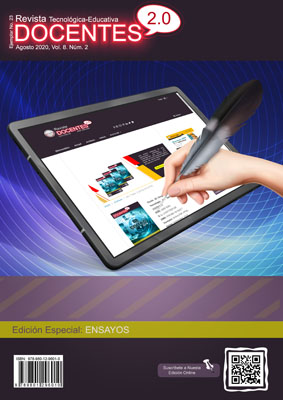Reflections on Philosophy and Scientific Reality
 DOI:
https://doi.org/10.37843/rted.v8i2.151
DOI:
https://doi.org/10.37843/rted.v8i2.151
Main Article Content
Abstract
The objective of this essay was to generate some illustrative reflections of philosophical schemes of merit regarding the scientific field, being in doctoral university academic environments where currents that have become a trend are perceived, such as the poststructuralist approach, relativism, phenomenological research hermeneutics, among others. Today, the importance of philosophy with respect to humanistic existentialism in scientific contexts takes on special significance, encompassing important spaces to produce knowledge in positivist and postpositivist orientations where Gadamer's philosophical hermeneutics is framed. All of this shows an anti-scientific trend based on the manifesto of the same nature promoted by Wilhelm Dilthey. To a large extent, this responds to a necessary reflection on some philosophical trends that should serve as a criterion of scientific validity, despite the existence of an approach based on a naturalized epistemology from which it is conceived to unlink science and philosophy. In this sense, it seems pertinent to retake the necessary work of reflecting on these fundamental philosophical tendencies to achieve innovations within the planes of knowledge from doctoral university environments, but with acceptable standards linked to a high theoretical hiring as an unavoidable task. Until we understand a necessary relationship of complementarity between research with respect to philosophical currents, we will continue to accommodate processes lacking acceptable standards.
Downloads
Metrics
Article Details

This work is licensed under a Creative Commons Attribution-NonCommercial-NoDerivatives 4.0 International License.
Those authors who have publications in our journal accept the following terms:
- When a work is accepted for publication, the author retains rights of reproduction, distribution of his/her article for exploitation in all countries of the world in the format provided by our magazine and any other magnetic medium, optical, and digital.
- Authors will retain their copyright and guarantee the journal the right first to publish their work, which will be simultaneously subject to the Creative Commons Acknowledgment License (Attribution-NonCommercial-NoDerivatives 4.0 International (CC BY-NC-ND 4.0)). That allows third parties to copy and redistribute the material in any medium or format, under the following conditions: Acknowledgment - You must properly acknowledge authorship, provide a link to the license, and indicate if any changes have been made. You may do so in any reasonable way, but not in a way that suggests you have the licensor's endorsement or receive it for your use. NonCommercial - You may not use the material for a commercial purpose. NoDerivatives - If you remix, transform, or build from the material, you cannot broadcast the modified material. There are no additional restrictions - You cannot apply legal terms or technological measures that legally restrict you from doing what the license allows.
- Authors may adopt other non-exclusive license agreements to distribute the published version of the work (e.g., deposit it in an institutional archive or publish it in a monographic volume) provided that the initial publication in this journal is indicated.
- Authors are allowed and recommended to disseminate their work through the Internet (e.g., in institutional telematic archives, repositories, libraries, or their website), producing exciting exchanges and increasing the published work's citations.
- Request of withdrawal an article has to be done in writing by the author to the Editor, becoming effective after a written response from the Editor. For this purpose, the author or authors will send correspondence via e-mail: [email protected].
- The author will not receive financial compensation for the publication of his work.
- All Docentes 2.0 Journal publications are under the Open Journal System (OJS) platform at: https://ojs.docentes20.com/.
References
Arias, F (2012). El Proyecto de Investigación.6 ta Edición. Editorial Episteme. Caracas. República Bolivariana de Venezuela.
Cervo, A y Bervian, P. (1989). Metodología Científica. Bogotá: McGraw-Hill.
Sierra Bravo, R (1991). Técnicas de investigación Social. (7° ed).Madrid. Paraninfa.
Sabino, C (2002). El Proceso de investigación. Caracas. Panapa.
Padrón J. (2007). Tendencias epistemológicas de la investigación científica en el Siglo XXI. Entre Temas. [Página web]. Disponible: https://www.moebio.uchile.cl/28/padron.html. [Consulta: 2020, abril 06].
Padrón, J. (2013). Epistemología Evolucionista. Una visión integral. [Página web]. Disponible: https://www.grin.com/document/412021. [Consulta: 2020, abril 06].






